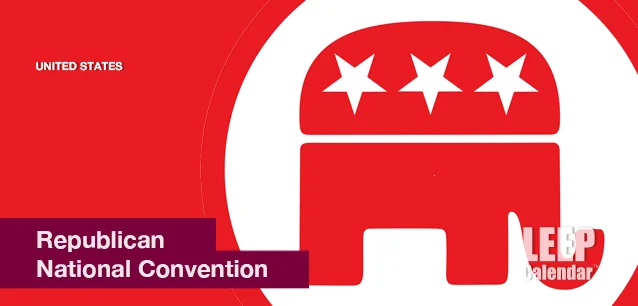 AD
AD
Today is: January 06
Scroll to explore events active on this date.
LEEP INK FEATURES

August? Absolutely!
In August, we live through the Dog Days of Summer. It's hot and often humid, and those who can leave for better climates do. Down south, winter is in full force. August is also known as "the ...

In The Heat of July: July 2025 Events
Is it hot enough (or cold enough if you're below the equator) for you yet? There is actually a day for that! Like every month, I pick a diverse collection of events you may or may not know about. This ...

May Blooms: Events in May 2025
Along with October, May is one of the most densely packed months of the year. It's before the summer humidity and the last whole month of the school year. The weather is warming in t...
About the Republican National Convention
Rallies & Protests , United States
Ends: Jul 18, 2024
DESCRIPTION:
The Republican National Convention is where the Republican Party nominates its Presidential and Vice Presidential candidates for the upcoming election.
Historically, the Republican Party represented anti-slavery, pro-business, and many progressive ideas, including environmental stewardship, the support of education and science, and limited, but not anarchist, forms of government oversight. That has changed drastically in the past fifteen to forty years. If you identify as a Republican today, you would have most likely been a Democrat through the 1920s and vice versa. Both parties switched positions between the 1930s and 1960s due to the Great Depression, Cold War, and the Civil Rights movements.The following is an overview of some key historical events and changes to the Republican Party.
Early History: 1850s - 1900
The Republican Party began in 1854 as an anti-slavery party. Its platform focused on opposing the expansion of slavery into new states and territories, a stance that attracted former Whigs, Free Soilers, anti-slavery Democrats, and others. Abraham Lincoln, the first Republican President, led the nation through the Civil War to preserve the Union and end slavery.
During the Reconstruction era, the Republicans were known for supporting civil rights for newly freed slaves and their opposition to the former Confederate leaders. They also promoted economic policies that supported industrial growth, high tariffs, and a robust national banking system. Tariffs allowed the United States to flourish without income taxes, something Republicans vehemently opposed.
Progressive Era: 1900 - 1930
During the Progressive Era, some Republicans, like Theodore Roosevelt, advocated for progressive reforms to curb big businesses' power and improve working conditions. However, there was still a robust alt-right force within the party that resisted these changes.
Mid-20th century: 1930 - 1960
During the Great Depression, the party opposed many of Franklin D. Roosevelt's New Deal policies, preferring less government intervention in the economy.
After World War II, the party continued to push for limited government and lower taxes but generally supported a global view on foreign policy to contain communism.
Civil Rights and the Southern Strategy: 1960 - 1980
In the 1960s, the party began to shift on civil rights. While Republicans like Senator Everett Dirksen played crucial roles in passing the Civil Rights Act of 1964, the party also began to employ the "Southern Strategy," appealing to white voters in the South who were unhappy with the Democratic Party's support for civil rights. The 1960s through the 1980s is when the party shifted from being progressive to ultra-conservative. It was also when divorce rates skyrocketed, immigration included more people from non-European backgrounds, and ultra-conservative Evangelical Christians entered the political sphere. They focused on stopping several social trends, including racial equality, women's rights, and abortion. This period significantly shifts the party's appeal, positions, and base.
Modern Era: 1980 - 2001
Starting with Ronald Reagan in the 1980s, the party emphasized tax cuts to protect investors, deregulation, an end to affordable college, the beginning of stock market-based retirement plans (401Ks), the privatization of health care insurance into HMOs, a rapid escalation in military spending, the deregulation of communications and other public commons, and what the party coined as "conservative social values," by intensifying its stance on issues like abortion, gun rights, and gay rights, forcing it further to the right.
Post 911 to Present
With the wars in Afghanistan and Iraq, followed by the election of Barak Obama as President in 2008 and 2012, the party became more nationalist and populist, especially under President Donald Trump. This shift has led to a greater focus on immigration, skepticism towards international agreements and institutions, a distrust of the media, science, and history, an us versus them view of governance, and a more aggressive approach to trade.
Conclusion
The Republican Party has evolved from an anti-slavery and pro-industrial growth party to a complex coalition that includes conservatives, libertarians, nationalists, and others. Key shifts include:
Adopting the Southern Strategy repositioned the Republican party on the opposite side of its founding principles.
The Reagan administration's emphasis on deregulation, privatization, and conservative economic and social policies removed many programs that supported low to middle-income Americans in education, health, retirement, and the community commons.
The September 11, 2001 attacks on the United States ushered in an era of secrecy, increased military spending, surveillance, and distrust of academia and the media.
The recent populist turn increased during the Obama administration and found its footing in social media and a champion in the Trump administration. Its focus turned from policy and platform governance to grievance rule.
These changes reflect broader shifts in American politics, economics, and culture.
VIDEOS
SUPPORTING DOCUMENTS
Currently, this event does not have supporting documents.
ADDITIONAL IMAGES
Currently, this event does not have supporting images.
Where would you like to go now?
 AD
AD


/footer-logo.svg)
